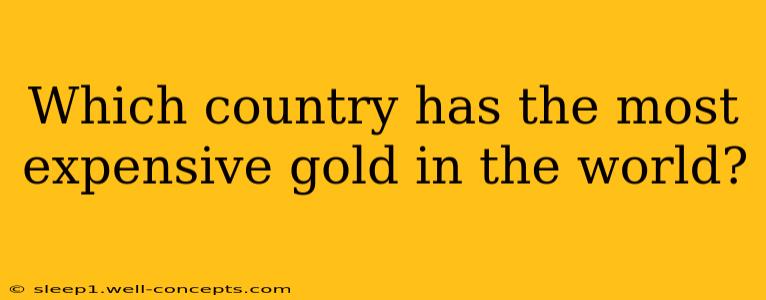Decoding Global Gold Prices: Where is Gold Most Expensive?
The question of which country has the "most expensive gold" is trickier than it seems. The price of gold is largely standardized globally, based on the price per troy ounce on international markets like the COMEX (Commodity Exchange). However, the final cost a consumer pays can vary significantly from country to country due to several factors. It's not about the gold itself being inherently more expensive, but rather the added costs associated with buying it.
Understanding the Price Fluctuations:
The spot price of gold, the benchmark price for immediate delivery, is usually quoted in US dollars per troy ounce. While this price fluctuates throughout the day based on various economic indicators and global events, it remains relatively consistent across the globe. This means that the raw material cost of gold is generally the same worldwide.
Factors Influencing the Final Cost:
Several factors contribute to the variation in the final price a consumer pays for gold in different countries:
-
Taxes and Duties: Import duties, sales taxes (VAT), and other government levies vary widely between nations. These taxes significantly impact the final price, making gold more expensive in some countries than others. High-tax jurisdictions will naturally see a higher overall cost.
-
Currency Exchange Rates: The price of gold in local currency is directly influenced by the exchange rate between that currency and the US dollar. A weakening local currency against the dollar will make gold more expensive in that country.
-
Retail Markups: Jewelers and dealers add markups to the spot price to cover their operational costs and profit margins. These markups can differ substantially based on the retailer, location, and demand. Luxury brands, for example, often have higher markups than smaller, independent businesses.
-
Import Regulations and Restrictions: Some countries may have strict regulations on importing gold, leading to higher costs due to increased processing time and associated fees.
-
Supply and Demand: Local demand for gold can also influence prices. In countries with high demand for gold jewelry or investment, prices may be slightly inflated due to scarcity or higher premiums.
Where is Gold Often Perceived as More Expensive?
While pinpointing a single country with the most expensive gold is impossible without considering all the factors above and specifying the type of gold purchase (bullion, jewelry, etc.), countries with high import duties, taxes, and weak currencies relative to the US dollar will often see higher final consumer prices. These might include some countries in Europe, South America, or parts of Asia, depending on current economic conditions and government policies.
Conclusion:
The price of gold is a complex interplay of international markets, local regulations, and business practices. While the raw material cost remains consistent globally, the final price a consumer pays is influenced significantly by local factors. Therefore, there's no single answer to which country has the most expensive gold, as it varies depending on the context. Careful consideration of all these factors is necessary to make informed purchasing decisions.

